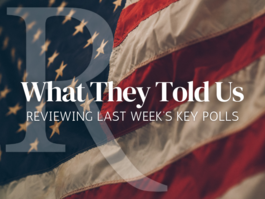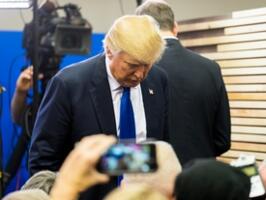What Do The Democrats Want? by Ted Rall
In the 1970s, when I was a kid, I asked my mother to explain the difference between the two major parties. "Democrats," she explained, "are the party of the working man. Republicans represent big business."

In the 1970s, when I was a kid, I asked my mother to explain the difference between the two major parties. "Democrats," she explained, "are the party of the working man. Republicans represent big business."

Most voters continue to believe Islamic leaders should do more to promote peace in their faith, but they are split on whether the religion itself encourages violence more than other faiths.

By the time Air Force One started down the runaway at Naval Air Station Sigonella in Sicily, to bring President Trump home, the Atlantic had grown markedly wider than it was when he flew to Riyadh.

It's just about graduation time for many high school seniors in this country, but most voters still don't think those graduates are ready for college or the workforce.

Thirty-seven percent (37%) of Likely U.S. Voters think the country is heading in the right direction, according to a new Rasmussen Reports national telephone and online survey for the week ending May 25.

More Americans than ever now honor Memorial Day, today’s federal holiday that recognizes military personnel who have given their lives for our country.

Most of the major news came from abroad this week, as Donald Trump made his first foreign trip as president and England suffered the deadliest terror attack on its soil since 2005.

Most Americans think it’s likely a terrorist attack comparable to the Manchester bombing will happen in the United States, but they're not afraid to attend big events.

What a difference a week makes. On May 19, President Donald Trump took off in Air Force One for the Middle East and Europe. He left behind a Washington and a nation buzzing about his firing of FBI Director James Comey, the multiple reasons he had given for doing so, the meeting he'd had with the Russian foreign minister a day later and his statement that Comey is a "nut job."

Chelsea Manning, the former Army intelligence analyst sentenced to 35 years in prison for releasing classified government documents to the website WikiLeaks, was released from prison earlier this month after President Obama commuted her sentence as one of his final presidential actions. But few voters view Manning favorably and most disagree with Obama’s parting decision.

On Sept. 1, 1864, Union forces under Gen. William Tecumseh Sherman, victorious at Jonesborough, burned Atlanta and began the March to the Sea where Sherman's troops looted and pillaged farms and towns all along the 300-mile road to Savannah.

President Trump and his family met with Pope Francis in the Vatican earlier this week, and while the meeting was met with mixed emotions, voters still generally believe the United States has a friend in the pope.

The radical Islamic State group (ISIS) has proudly taken credit for the slaughter of innocents earlier this week at a concert in Manchester, England, and voters here strongly agree with President Trump that ISIS needs to be totally wiped out.

Most voters still feel President Trump is to blame for his bad relationship with the media but also don't think there is anything he can do about it.

In the wake of the international WannaCry cyberattacks last week, Americans are more concerned than ever about the safety of the country’s online economic systems.

For now, everyone knows the sonorous name and cherubic face of 8-year-old Saffie Rose Roussos.

President Trump is heading to Brussels today for the NATO summit, and support for the organization is up as voters continue to see a need for the alliance more than 60 years after it was formed.

Have you heard the latest scandal involving President Trump?
During a speech in Saudi Arabia, Mr. Trump applauded Middle East leaders for a series of steps they have taken to confront radical Islamic terrorism.

The New York Times' hostility to industry gets worse every day.

President Trump has visited both Saudi Arabia and Israel as part of his first foreign trip as President of the United States this week. But voters believe this country’s relationship with Israel is more important to stability in the Middle East than the relationship with Saudi Arabia is.